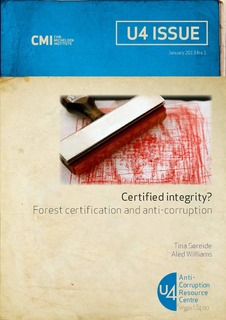| dc.contributor.author | Søreide, Tina | |
| dc.contributor.author | Williams, Aled | |
| dc.date.accessioned | 2018-01-04T08:18:29Z | |
| dc.date.available | 2018-01-04T08:18:29Z | |
| dc.date.issued | 2013-01-22 | |
| dc.identifier | oai:www.cmi.no:4704 | |
| dc.identifier.citation | Bergen: Chr. Michelsen Institute (U4 Issue 2013:1) 20 p. | |
| dc.identifier.uri | http://hdl.handle.net/11250/2474875 | |
| dc.description.abstract | Forest certification schemes regulate forest exploitation and trade across many countries. In the absence of a multilateral agreement on limiting deforestation, they provide rules to balance the social, economic and ecological values of forest resources. Expansion of these schemes into tropical countries that display poor governance and high levels of corruption has raised questions about these schemes’ performance in such contexts. Referring to the case of the Forest Stewardship Council – a global forestry certification system – the authors looked at whether forest certification schemes can address corruption issues. While forest certification schemes are not primarily geared towards detecting and preventing corruption, they may have some anti-corruption effects in countries where corruption is sporadic but not systemic. This is due to their role in documenting forest management practices and applying third-party monitoring. | |
| dc.language.iso | eng | |
| dc.publisher | Chr. Michelsen Institute | |
| dc.relation | U4 Issue | |
| dc.relation | 2013:1 | |
| dc.relation.ispartof | U4 Issue | |
| dc.relation.ispartofseries | U4 Issue 2013:1 | |
| dc.relation.uri | https://www.cmi.no/publications/4704-certified-integrity | |
| dc.subject | Anti-Corruption | |
| dc.subject | Corruption | |
| dc.subject | Forest Governance | |
| dc.subject | Certification | |
| dc.subject | Natural Resource Management | |
| dc.title | Certified integrity? Forest certification and anti-corruption | |
| dc.type | Research report | |
